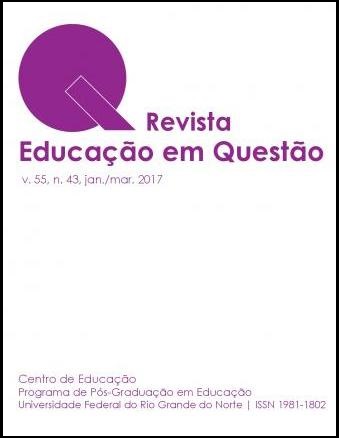Reflections on the social function of the university professor
DOI:
https://doi.org/10.21680/1981-1802.2017v55n43ID11813Keywords:
Medieval University, Teacher training, DisciplineAbstract
In this article, we approached the issues considered crucial for teacher training, starting at the habitual ideas and behaviors in education. The comparison of aspects which support the teacher’s social role is established based on History, specifically on the medieval origins of the university. The main purpose is to highlight the notion that discipline include effort and responsibility, that are essential features for training as well as make part of a knowledge that a teacher needs for his performance. We follow the principles theoretical and methodological of Social History, particularly the Marc Bloch’s concept of fundamentum and the perspective of long-term developed by Fernand Braudel. We understand that one of results of division (or ranking) between theory and practice is the fragility of knowledge, harmful to education at all levels, once we act by using the knowledge we have.
Downloads
References
ALENCASTRO, Catarina. Brasileiro lê, em média, quatro livros por ano, revela pesquisa. O Globo, Rio de Janeiro, 28 mar. 2012. Disponível em: http://oglobo.globo.com/sociedade/educacao/brasileiro-le-em-media-quatro-livros-por-ano-revela-pesquisa-4436899. Acesso em: 5 abr. 2016.
ALLEGRETTI, Fernanda. Artigos de segunda. Veja, São Paulo, n. 50, p. 104-110, 10 dez. 2014.
ARENDT, Hannah. Entre o passado e o futuro. São Paulo: Perspectiva, 2011.
ARISTÓTELES. Ética a Nicômaco. 3. ed. Bauru: Edipro, 2009.
BASE Nacional Comum Curricular. Brasília: MEC/CONSED, 2015. Disponível em: http://basenacionalcomum.mec.gov.br. Acesso em: 10 maio 2016.
BLOCH, Marc. Apologia da história, ou, o ofício do historiador. Rio de Janeiro: Jorge Zahar, 2001.
G1 GLOBO. 2014. Brasil fica de novo fora do top 200 de ranking das melhores universidades. Disponível em: http://g1.globo.com/educacao /noticia/2014/10/brasil-fica-de-novo-fora-do-top-200-de-ranking-das-melhores-universidades.html. Acesso em: 1 dez. 2014.
LIBÂNEO, José Carlos. Diretrizes Curriculares da Pedagogia: imprecisões teóricas e concepção estreita da formação profissional de educadores. Educação & Sociedade, Campinas, v. 27, n. 96, p. 843-876, out. 2006.
KANT, Immanuel. Sobre a pedagogia. Piracicaba: Editora da Universidade Metodista de Piracicaba, 2011.
MARTINS, José de Souza. A USP sob ataque. O Estado de S. Paulo, 29 nov. 2014. Disponível em: http://alias.estadao.com.br/noticias/geral,a-usp-sob-ataque,1599621. Acesso em: 1 dez. 2014.
MORIN, Edgar. Os sete saberes necessários à educação do futuro. 2. ed. São Paulo: Cortez; Brasília, DF: UNESCO, 2000.
MORIN, Edgar; CYRULNIK, Boris. Diálogo sobre a natureza humana. Lisboa: Instituto Piaget, 2004.
MORIN, Edgar. A cabeça bem-feita: repensar a reforma, reformar o pensamento. 22. ed. Rio de Janeiro: Bertrand Brasil, 2015.
MOURA, Rafael Moraes. Universitários brasileiros leem apenas de 1 a 4 livros por ano, revela Andifes. O Estado de S. Paulo, São Paulo, 13 ago. 2011. Disponível em: http://www.estadao.com.br/noticias/geral,universitarios-brasileiros-leem-apenas-de-1-a-4-livros-por-ano-revela-andifes-imp-,758017. Acesso em: 10 maio. 2016.
OLIVEIRA, Terezinha. A universidade medieval: uma memória. Mirabilia, n. 6, p. 63-78, jun./dez. 2006.
OLIVEIRA, Terezinha. Origem e memória das universidades medievais: a preservação de uma instituição educacional. Varia história, Belo Horizonte, v. 23, n. 37, p. 113-129, jan./jun. 2007.
OLIVEIRA, Terezinha. A importância da leitura de escritos tomasianos para a formação docente. Notandum, São Paulo/Porto, n. 21, p. 75-83, set.-dez. 2009.
PIEPER, Josef. Abertura para o todo: a chance da universidade. Mirandum, n. 9, jan./jun. 2000. Disponível em: http://www.hottopos.com.br/mirand9/mirand9.htm. Acesso em: 1 dez. 2015.
POLATO, Amanda. Zoara Failla: “Se o professor não é leitor, não consegue transmitir o prazer da leitura”. Época, 11 set. 2012. Disponível em: http://revistaepoca.globo.com/Sociedade/noticia/2012/09/zoara-failla-se-o-professor-nao-e-leitor-nao-consegue-transmitir-o-prazer-pela-leitura.html. Acesso em: 05 abr. 2016.
SEVERINO, Antônio Joaquim. Educação, sujeito e história. São Paulo: Olho d’água, 2012.
SILVA, Tomaz Tadeu da. Documentos de identidade: uma introdução às teorias do currículo. Belo Horizonte: Autêntica, 1999.
SIMAS, Anna. Um terço dos professores não lê livros. Gazeta do Povo, Curitiba, 9 fev. 2013. Disponível em: http://www.gazetadopovo.com.br/vida-e-cidadania/um-terco-dos-professores-nao-le-livros-cyfb5mg6wkgu8czf3cehrrnj0. Acesso em: 5 abr. 2016.
TAKAHASHI, Fábio. Muita teoria e pouca prática formam os professores. Folha de S. Paulo, São Paulo, 4 ago. 2013. Disponível em: http://www1.folha.uol.com.br/educacao/2013/08/1321237-formacao-do-professor-tem-muita-teoria-e-pouca-pratica.shtml. Acesso em: 5 abr. 2016.
TELES, Lília. 70% dos brasileiros não leram em 2014, diz pesquisa da Fecomércio-RJ. G1 Globo, 1º abr. 2015. Disponível em: http://g1.globo.com/jornal-da-globo/noticia/2015/04/70-dos-brasileiros-nao-leram-em-2014-diz-pesquisa-da-fecomercio-rj.html. Acesso em: 5 abr. 2016.
TOMÁS DE AQUINO. De magistro. São Paulo: Martins Fontes, 2001.
TOMÁS DE AQUINO. Suma Teológica. São Paulo: Loyola, 2005. (v. IV. I seção, II parte).
Downloads
Published
How to Cite
Issue
Section
License
The Journal Education in Question shall retain the copyright in all articles that it publishes.
The authors and co-authors of articles and book reviews, published in the Journal Education in Question, shall wait for at least 1 (one) year before they are allowed to submit new works for publication.






